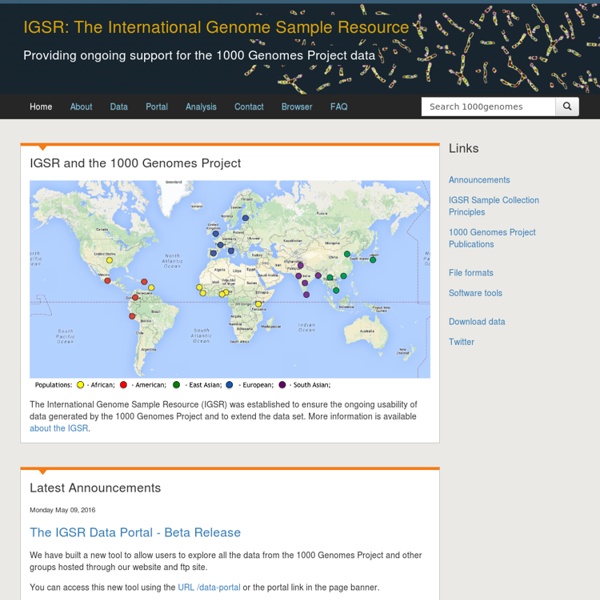



ASHG 2010: 1000 Genomes Project Tutorials ASHG 2010: 1000 Genomes Project Tutorial Videos The 1000 Genomes Project has released the data sets for the pilot projects and for more than 1000 samples for the full-scale project. A tutorial for how to use the data was held at the 2010 American Society of Human Genetics (ASHG) annual convention on November 3. Videos for each of the tutorial sessions are now available. The tutorial describes 1000 Genomes Project data, how to access it and how to use it. Each of the speakers and their topics are listed below along with their tutorial videos and PowerPoint slides. All PowerPoints listed below are in PDF format. 1000 Genomes Project Tutorial Videos and Powerpoint Slides Top of page
PennCNV PennCNV: copy number variation detection Welcome! PennCNV is a free software tool for Copy Number Variation (CNV) detection from SNP genotyping arrays. Currently it can handle signal intensity data from Illumina and Affymetrix arrays. With appropriate preparation of file format, it can also handle other types of SNP arrays and oligonucleotide arrays. PennCNV implements a hidden Markov model (HMM) that integrates multiple sources of information to infer CNV calls for individual genotyped samples. Click the menu to the left to navigate through the PennCNV website. What’s new: : Updated PennCNV version (June 2011) can be accessed in the Download page. : User-contributed programs (December 1 , 2010 and Feburary 27, 2011) to convert PennCNV call to PLINK format, and to plot PennCNV rawcnv file on multiple individuals to a high solution PNG file for comparing CNV calls across individuals. : A few minor changes to helper scripts can be accessed in the Download page (June 07, 2010). Reference:
SIFT PLINK This page describes some basic file formats, convenience functions and analysis options for rare copy number variant (CNV) data. Support for common copy number polymorphisms (CNPs) is described here. Copy number variants are represented as segments. These segments are essentially represented and analysed in a similar manner to how PLINK handles runs of homozygosity (defined by a start and stop site on a given chromosome). Allelic (i.e. basic SNP) information is not considered here: PLINK skips the usual procedure of reading in SNP genotype data. Basic support for segmental CNV data The basic command for reading a list of segmental CN variants is plink --cnv-list mydata.cnv --fam mydata.fam --map mydata.cnv.map which can be abbreviated plink --cfile mydata (note that the map file must have the .cnv.map map extension). Having a header row is optional; if the first line starts with FID it will be ignored. Creating MAP files for CNV data plink --cnv-list mydata.cnv --cnv-make-map plink.cnv.map and
CHGV (Duke University) Ensembl Genome Browser UCSC Genome Browser